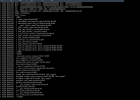Yep, happened to me just now, too, with an Intel X710-T2L card. I was confused why it didn't come back up until I logged into the console and saw that the uptime was only a few minutes.Same issue with a Dell PowerEdge R730xd equipped with the Intel/Dell x710 4 port interface card. I am posting this so others with this Dell network card will not be surprised like I was when all the interfaces disappeared.
And yes, this absolutely needs to be mentioned in the release notes.
Updating the interface names in /etc/network/interfaces (including in the bridge definitions) got me back up and running, but it would have been nice to know ahead of time that I'd need to do that.


